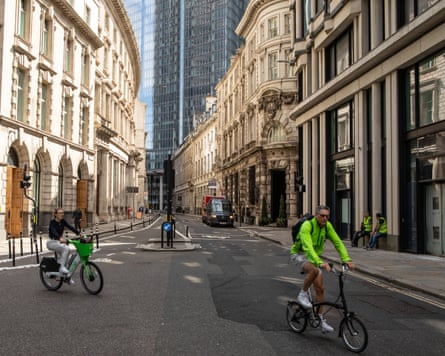Could the future of Canary Wharf lie in thumping beats and dancefloor raves? Could the City of London become a global hub of nocturnal revelry?
With financial districts struggling to bounce back to full capacity post-Covid, and the nightlife industry facing an existential crisis, there are suggestions clubs could move into deserted office blocks at evenings and weekends.
In its annual eccentric report on the future of leisure, the creative studio Bompas and Parr says it envisions “a future where financial districts in London and the world over are transformed into world-class late-night party zones”.
“By day, the city bustles with suits and stocks. By night, it’s reborn as a pulsating rave arena,” the report says. “With few residents to file noise complaints, organisers capitalise on the empty, echoing canyons of glass and steel.
“Empty office lobbies become sought-after DJ booths, rooftops host industry defining light shows, and any space that isn’t locked morphs into a dancefloor to create a sprawling web of passionate chaos as capitalism and counterculture merge.”
It may sound far-fetched, but it could become reality as the corporate and hospitality industries respond to changing behaviour in a post-Covid world.
Michael Kill, the chief executive of the Night Time Industries Association (NTIA), said the prospect of few noise complaints and the need to boost footfall in areas that workers have deserted in the shift to work from home made it an appealing prospect.
“There are conversations going on about things like the City of London, where the financial district is, as there is a very limited residential core so without a doubt, given some of the noise complaints and restrictions, that actually makes sense and works for nightlife,” Kill said.

